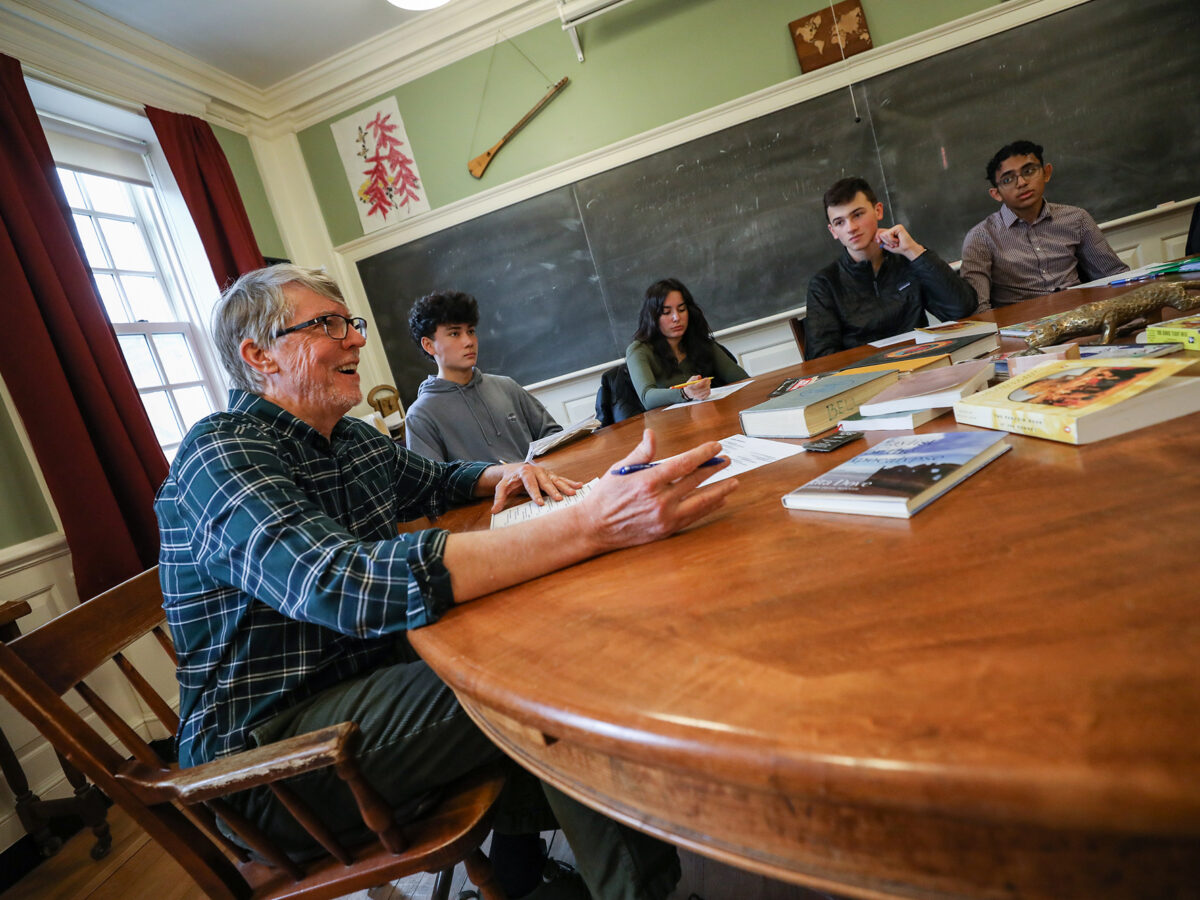Reading Rita Dove

“Today we’re starting to grapple with Rita Dove,” says Duncan Holcomb, instructor in English, on a recent Friday morning in Phillips Hall. Immediately, the chatter around the Harkness table in Holcomb’s English 420 class quiets down, as the students turn to excerpts from the award-winning poet’s latest work, Playlist for the Apocalypse.
On Wednesday, Dove will give a reading in Assembly Hall as part of the Lamont Poetry Series. She is the latest in a long line of distinguished poets invited to Exeter’s campus to give readings and attend English classes thanks to the support of the Lamont Fund, established in 1982 by Corliss Lamont, Class of 1920, and Jacquelyn Thomas, former Academy Librarian.
Even among these distinguished ranks, Dove’s achievements as a poet, novelist, essayist, playwright and educator stand out. In addition to winning the Pulitzer Prize for Poetry in 1987 for Thomas and Beulah, she served as U.S. poet laureate from 1993 to 1995. A longtime creative writing professor at the University of Virginia, she is the first poet to receive both the National Humanities Medal and the National Medal of Arts, and more recently won the 2022 Rebekah Johnson Bobbitt National Prize for Poetry, an award for lifetime achievement from the Library of Congress.
Holcomb is one of several English instructors reading Dove’s work with his students in anticipation of her visit. During this particular class meeting, he asks the students to talk amongst themselves about which of the assigned poems they’d most like to discuss. The students’ overlapping voices fill the room again, as they point out favorite passages to each other and ask questions about perspective and theme.

The first poem they choose to discuss, “Woman, Aflame,” is one of a series that Dove originally wrote for A Standing Witness, an operatic song cycle composed by Richard Danielpour that bears witness to the past five decades of U.S. history. Subtitled “Fifth Testimony: Roe v. Wade,” the poem begins:
“She was a mother. She was a girl who dreamed of becoming
a mother someday. She was either a tease or a tramp, a lover
or a wife — still she had to do the counting…”
“I think the line breaks are pretty interesting,” says Michael Goodall ’24. “Like the first line: ‘She was a girl who dreamed of becoming,’ and then the next line skips to ‘a mother someday.’ I feel like this shows the lack of opportunity, and how this optimism is kind of simmered down with other factors.”
“One thing that stood out to me is at first you would think this is all talking about one woman,” Aliyana Koch-Manzur ’24 responds. “But I think it’s kind of encompassing many women’s experiences… . By using one pronoun to describe all women, it’s saying that this is something all woman could be affected by.”
The next poem, “Declaration of Interdependence,” contains two alternating narrative voices, and Holcomb asks two students to read the poem aloud together. The students quickly identify the two voices — one belonging to a Jewish person, the other to a Black person — and discuss how the poem deals with some of the stereotypes that are often applied to each.
“What is the ‘interdependence’ in the title?” Holcomb asks. “It’s the opposite of independence, right?”
“It’s to show how both these groups have similarities in their mistreatment,” says Nafees Abdullah ’24. “Fight’s not the right word, but it’s the one that comes to mind — why fight over that when you can come together and support each other?”
“I wonder if, like the Declaration of Independence is a way for America to have freedom from the British, this declaration of interdependence through unity of minority groups is finding freedom from these stereotypes,” says Corinne Wingate ’24. “They’re not seen as having those commonalities, but by asserting how similar they are, it’s like having freedom as a wider group.”
The group concludes by briefly discussing a third poem, “From the Sidelines,” before the class period ends. “We can come back to that,” Holcomb says. “Make sure to schedule your conferences with me by Wednesday — which is when Rita Dove gets here.”
In addition to her reading and book signing at 7:30 p.m. Wednesday, Dove will hold a Q&A in the Assembly Hall the following day